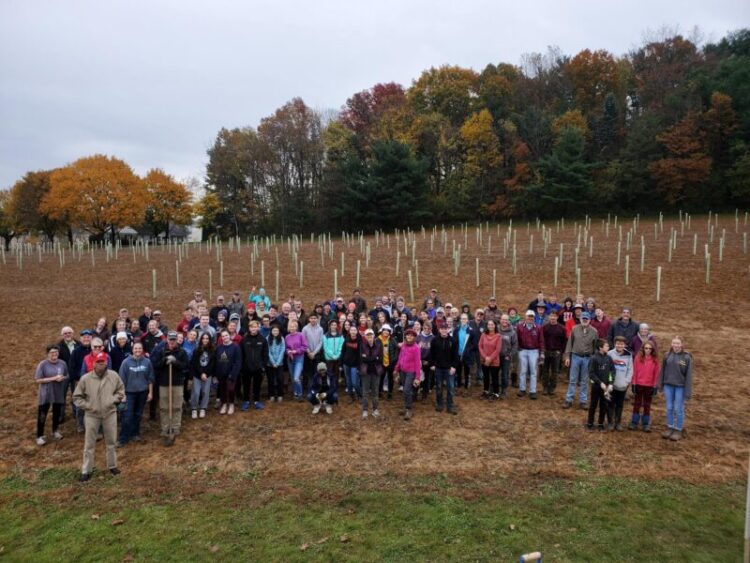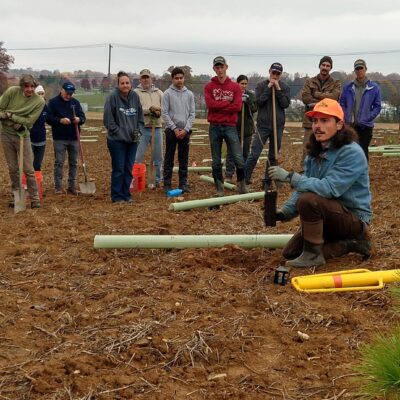
Above, volunteers from Landisville Mennonite Church and the community pose together after planting 640 trees on the church’s property. At left, Ryan Davis, Pennsylvania Forest Projects Manager at Alliance for the Chesapeake Bay, explains how to plant tree seedlings. Photo credits: Ryan Davis (above) Chris Fretz (left).
On two Saturdays in November, volunteers gathered at Landisville Mennonite Church, Landisville, Pa., to convert 3.65 acres from farmland into forest and meadow. This was part of the congregation’s efforts to improve water quality, expand pollinator and wildlife habitat and address climate change. On November 6, over 80 volunteers planted meadow seed on 1.25 acres, and the following Saturday, November 13, over 100 volunteers planted 640 tree seedlings on 2.4 acres.
On both days a statement was read out loud, acknowledging that the land was home to Indigenous Peoples before the church was founded there, and that the planting project is part of the congregation’s work of reconciliation with indigenous peoples.
Lots of help from the community
“We wanted to do this as part of our commitment to caring for God’s creation, both now and for future generations,” said Brenda Horst, a member of Landisville Mennonite who helped organize the project. “But we couldn’t have done it alone. We really relied on the expertise of the Alliance for the Chesapeake Bay and volunteers from the community get this done.”
In addition to volunteers from the congregation and from the Alliance, volunteers came from Hempfield High School, Franklin & Marshall College, Etown College, local Boy Scout Troops, Interfaith Partners for the Chesapeake, Lancaster Conservancy, Hope United Methodist Church, and several Mennonite congregations.
Ryan Davis, the Pennsylvania Forest Projects Manager at the Alliance, helped plan the project and led the plantings both days.
“The tree planting went very well on Saturday! We have had large groups before but never so many on site at once,” said Davis. “The seeding and tree planting days were just the very beginning of the process. We can expect the meadow to begin benefitting pollinators and other wildlife next spring, as the vegetative diversity there skyrockets relative to when it was a crop field. Rain infiltration will improve by the second year and we will begin to sequester carbon in the soil within just a few years.”
In addition to the support from The Alliance for the Chesapeake Bay, Landisville Mennonite received a grant from Interfaith Partners for the Chesapeake for the meadow seed. Mennonite Men, the men’s organization for Mennonite Church USA, also gave a grant for the tree seedlings as part of Mennonite Men’s campaign to plant one million trees by the year 2030.
By Chris Fretz
